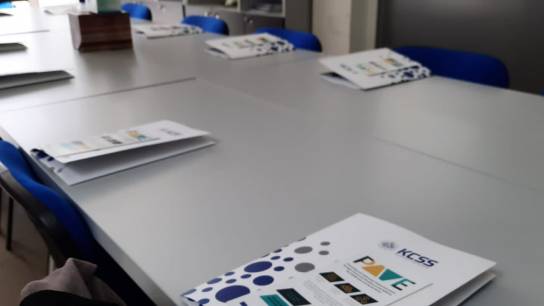
Kosovo: Focus group in Mitrovica
Within the implementation of the PAVE project, KCSS organized a focus-group discussion with representatives of institutions, civil society, religious institutions, and students from Mitrovica Municipality, to tackle the issue of violent extremism based on religion and ethnonationalism.
The field research will continue on other municipalities and with different groups and the results will help in extracting an important comparative analysis.
Main takeaways from the focus-group:
- Ethno-political radicalization it is seen with far greater concern as a potential for leading to violent extremism in Kosovo, compared to religious radicalization;
- Overwhelming feeling among the participants that while religious radicalization was/is a problem for Kosovo it ‘was blown out of the proportion’ for political agenda to undermine legitimacy of Kosovo as a country in the international society. They mention as an example the failure of the West to problematize Serbian Foreign Fighters going to Ukraine to join terrorist groups out of religious convictions as well in more numbers than Kosovar-Muslim did in Syria and Iraq;
- Storytelling to perpetuate a collective memory of victimhood as well as vilifying the other groups was agreed by the whole group to be one of the main push factors of radicalization leading to violent extremism. In more practical terms this means, parents or older generation speaking to younger generation about how malign the intentions of the other groups are, and ta warning to not trust members of the respective group, be that on the basis of religion or ethnicity;
- National media discussing ethnic-relations or religion, with individuals who are not perceived to be experts on the subject, or are seen to be significantly one-sided, greatly agitates people. This seemed to be particularly the case with Muslim community, who feel people who do not truly understand Muslim religion or are perceived to be biased speak with authority about Islam on TV debates, which makes members of the Muslim community feel that their religion is purposefully misrepresented by the media;
- Social media is seen as propaganda machine, and most effective tool to promote radicalization, both religious and ethno-political;
- Free speech is seen as a justification to attack and humiliate Muslim religion, especially when TV shows discuss Islam with guests or analysts that are perceived as bias and For internal use only
- Not for publication or sharing outside PAVE project PAVE has received Funding from the European Union’s Horizon 2020 research and innovation programme under Grant Agreement No. 870769. Page 2 with an agenda against Islam. Participants talk about democracy being abused, as a mantra to justify attacks and humiliation against Islam. They mention for example the case of the decision of the government to ban women veiling in public institutions and schools;
- Civil society is seen as highly politicized, and an instrument of foreign countries and actors;
- Participants discuss about Kosovo as still being a country in transition from legacy of conflict and international administration and trying to find its own identity as an independent state.
- Family and parents are seen as key to prevent radicalization, but note that no one really works with them in that kind of framework;
- Unresolved legacy of the war between Kosovo and Serbia is seen as key factor contributing to radicalization that leads to violent extremism. There are still hundreds of missing people on both sides (Albanians and Serbs), and the political rhetoric between Kosovo and Serbia perpetuates the legacy of the war. The overwhelming presence of hate public discourse between Kosovo and Serbia, also adds to the religious divisions, whereby religion is taken as a layer to add to ‘othering’ and promoting differences between communities;
- One of the legacies of the war between Kosovo and Serbia is the active rejection of the later of Kosovo as an independent country and this shapes radical narratives about Serbia in Kosovo, as a malign actor;
- Lack of rule of law and lack of European integration perspective for the country are also seen as a factor contributing to community vulnerability. People in Mitrovica South have limited confidence in the judiciary.
- Lack of critical thinking development program in schools is also seen a factor of vulnerability for communities;
- Lack of media education and awareness about social media in general, and how they can promote fake news is seen as a factor of vulnerability;
- Families, and especially mothers are seen as key factors of community resilience;
- Social capital and social safety nets through of large families are also seen as factors of resilience;